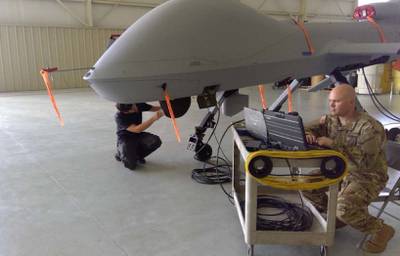WASHINGTON — The U.S. Army extended its contract with artificial intelligence and analytics company BigBear.ai as it constructs the Global Force Information Management system, which will provide service leaders an automated and holistic view of manpower, equipment, training and overall readiness.
The six-month extension for GFIM, as it’s known, is valued at $8.5 million. It builds upon a nine-month, $14.8 million deal announced in late 2022 as well as prototype work the year prior.
The management system is meant to consolidate more than a dozen aging applications. It will also automate a raft of tasks that were once done manually, such as determining unit status.
“GFIM is a game-changing capability that holds immense importance for the U.S. Army and has the potential to revolutionize processes by enabling data-driven decision-making, automation of critical functions, and real-time visibility,” Ryan Legge, BigBear.ai’s president of integrated defense solutions, said in a statement June 12.
RELATED

During the extension, BigBear.ai is expected to migrate GFIM to the cARMY cloud. Modernization of the Army’s networks and underlying computer infrastructure is among the service’s priorities; Army Secretary Christine Wormuth has said achieving digital fluency and data centricity is her No. 2 objective.
The extension for BigBear.ai comes on the heels of user testing in late May and early June. BigBear.ai staff, Army leaders and technical experts associated with GFIM attended. Army GFIM Capabilities Management Officer Lori Mongold in a statement Monday described the system as a “transformative leap forward in force management capabilities,” once fully fleshed out.
BigBear.ai last month unveiled a partnership with L3Harris Technologies, the 10th largest defense contractor by revenue, according to Defense News analysis.
As part of that agreement, BigBear.ai will supply L3Harris with its computer vision, predictive analytics and related applications in a bid to improve manned-unmanned teaming and identification and classification of foreign vessels for the Navy.
Colin Demarest is a reporter at C4ISRNET, where he covers military networks, cyber and IT. Colin previously covered the Department of Energy and its National Nuclear Security Administration — namely Cold War cleanup and nuclear weapons development — for a daily newspaper in South Carolina. Colin is also an award-winning photographer.








